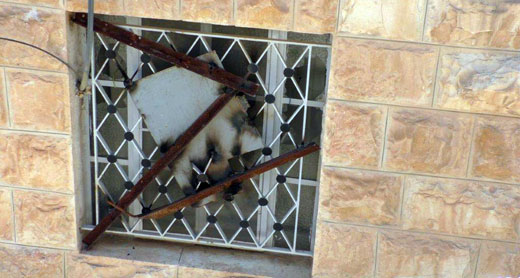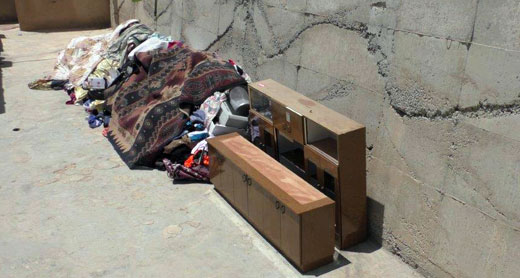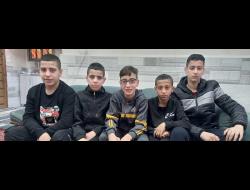
A window sealed in the Family's home. Photo: 'Amer 'Aruri, B'Tselem, 1 July 2015
On 1 July 2015, police officers sealed ‘Udai Abu al-Jamal’s family home. Abu al-Jamal was one of the perpetrators of the attack on the synagogue in Jerusalem’s Har Nof neighborhood last November, in which four worshippers were killed and seven were injured. A police officer was killed in a gun battle between the police and the attackers, but the exact origin of the fatal shot is unknown. The perpetrators, ‘Udai and Ghassan Abu al-Jamal, were killed by the police.
‘Udai Abu al-Jamal lived in his parents' house in Jabal al-Mukabber. His mother and father, Fatmeh and Abed Abu al-Jamal, are both in their fifties and live with four of their children, one of whom is 13 years old. At around 3:00 a.m., police and border police officers arrived at the family's home and demanded all family members vacate the house. The police then put out on the street some of the family’s belongings, including houseware, bedding and carpets. They proceeded to weld all doors and windows shut using steel rods and told the family they would be back to seal the house with concrete. Following their eviction,, the family received a tent from the International Committee of the Red Cross (ICRC) which it put up next to the house. The officers returned in the early evening and sealed the house with concrete.
The family members, who are not suspected of any involvement in the attack, received a demolition order two days after the synagogue attack. latter. The Israeli High Court of Justice dismissed a petition filed by HaMoked stating that the demolition constitutes collective punishment on 13 December 2014.

The family's belongings left in the street. Photo: 'Amer 'Aruri, B'Tselem, 1 July 2015
The Home Front Command also issued a demolition order for the home of Nadia Abu al-Jamal, the widow of the second perpetrator, Ghassan Abu al-Jamal, where she lives with her three young children. The Ministry of Interior has threatened to stop Nadia Abu al-Jamal’s family unification which allowed her to live in Jerusalem. She and her children now face possible deportation, which also constitutes collective punishment. However, the HCJ refused to issue an interim order that would hold off the deportation until the petition Abu al-Jamal filed through HaMoked is heard.
Since the occupation began, the military has destroyed hundreds of homes as a way of punishing the families of Palestinians who hurt Israelis, or who were suspected of doing so. This policy left thousands of people, including young children, without a roof over their heads, though they themselves were never accused of any wrongdoing, and there were no allegations against them. The military abandoned this policy in 2005, after the security establishment came to the conclusion that its disadvantages outweighed its advantages, but it was reinstated last summer after three students at a yeshiva in Bethlehem area were kidnapped and killed in June of 2014. The official claim was that the resumption of house demolitions was warranted by the drastic change in circumstances. Israel has since demolished four homes and sealed one as a punitive measure.
This claim, however, cannot justify the policy of punitive house demolitions, as it constitutes collective punishment which is prohibited under international law. Yet, despite the fact that this is an extreme measure and despite the clear position of jurists both in Israel and abroad that it is illegal, the Israeli HCJ consistently upholds it. The demolition or sealing of a home is a draconian, vindictive measure, taken against entire families who have done nothing and are accused of nothing.


